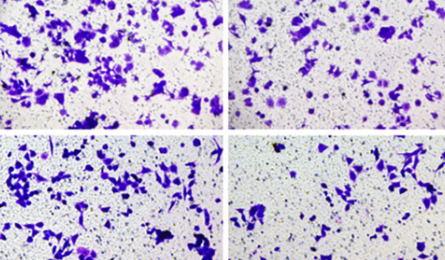miR-145-5p regulates hepatocellular carcinoma malignant advancement and immune escape via down-regulation of AcylCoA synthase ACSL4
DOI:
https://doi.org/10.17305/bb.2024.11209Keywords:
Hepatocellular carcinoma, HCC, miR-145-5p, ACSL4, proliferation, immune escapeAbstract
Hepatocellular carcinoma (HCC) exhibits a subtle onset, high incidence rates, and low survival rates, becoming a substantial threat to human health. Hence, it is crucial to discover fresh biomarkers and treatment targets for the early detection and management of HCC. CCK-8, scratch-wound, and transwell assays were used to evaluate the biological properties of HCC cell lines (Huh-7 and Hep3B). Bioinformatics analysis identified the downstream target mRNA of miR-145-5p as acyl-CoA synthetase long-chain family member 4 (ACSL4). RT-qPCR was used to test miR-145-5p and ACSL4 levels. Transwell chambers were used to co-incubate purified CD8+ T cells and HCC cells for 48 h, and the effect of CD8+ T cells on apoptosis in HCC cells was detected by flow cytometry. A subcutaneous graft tumor model was constructed, and ELISA kits were used to assess cytokine levels and CD8+ T cell activation markers. HCC cells showed a decline in miR-145-5p levels and a rise in ACSL4 levels. Overexpression of miR-145-5p hindered HCC cell proliferation, migration, and invasion, while stimulating CD8+ T cell activation. Conversely, overexpression of ACSL4 enhanced the malignant biological properties of HCC cells and reduced the effect of CD8+ T cells, while silencing ACSL4 had the opposite effect. miR-145-5p targeted and downregulated ACSL4, while overexpression of miR-145-5p weakened the promotion of HCC malignant progression caused by ACSL4 overexpression. Additionally, overexpression of miR-145-5p and silencing ACSL4 were effective in inhibiting tumor growth in vivo. In conclusion, miR-145-5p targets and downregulates ACSL4, leading to the inhibition of HCC malignant progression and preventing immune escape in HCC cells.
Citations
Downloads

Downloads
Published
Issue
Section
Categories
License
Copyright (c) 2024 Dingxue Wang, Wenqi Huang, Gao Li

This work is licensed under a Creative Commons Attribution 4.0 International License.









